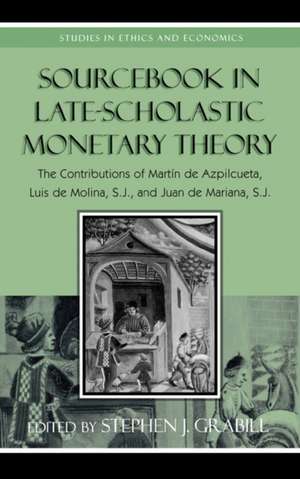Sourcebook in Late-Scholastic Monetary Theory
Autor Stephen J. Grabillen Limba Engleză Hardback – 30 noi 2007
Preț: 553.97 lei
Preț vechi: 683.92 lei
-19% Nou
Puncte Express: 831
Preț estimativ în valută:
105.100€ • 110.97$ • 87.71£
105.100€ • 110.97$ • 87.71£
Carte tipărită la comandă
Livrare economică 01-07 aprilie
Preluare comenzi: 021 569.72.76
Specificații
ISBN-13: 9780739117491
ISBN-10: 0739117491
Pagini: 394
Dimensiuni: 158 x 236 x 30 mm
Greutate: 0.69 kg
Editura: Lexington Books
ISBN-10: 0739117491
Pagini: 394
Dimensiuni: 158 x 236 x 30 mm
Greutate: 0.69 kg
Editura: Lexington Books
Recenzii
Scholars are indebted to Stephen Grabill for rescuing the works of these important Late Scholastics from undeserved obscurity. This collection is valuable not only because it fills a crucial gap in our understanding of the history of economic thought, but also because these are works of great insight in and of themselves. -- Thomas Woods, author of The Church and the Market Grabill roots his apology firmly enough in an overview of the scholastic tradition that non-specialists and general readers alike will appreciate his defense and understand the connections he outlines between high and late medieval economic thought and the Salamancan school... H-Net: Humanities and Social Science Reviews Online For each of the three texts, the Sourcebook efficiently accomplishes its goal of setting each authors' specific concerns in areas of moral theology and economics within full social and intellectual contexts. H-Net: Humanities and Social Science Reviews Online, January 2010 The book provides an excellent English source of works not often used by economic historians... invaluable to historians of economic thought... the book provides an excellent news source which should help broaden the horizons of classical economics. Sixteenth Century Journal This collection of texts in monetary theory will of course be extremely valuable to scholars of the history of economic thought, who will want to explore the place of these late-scholastic Spaniards in the emergence of modern economics. But this collection should also attract readers who are looking for interesting alternatives to the sterile positivism that constrains and diminishes so much of present-day economic thought. They will surely find such alternatives here, among writers who knew that what we believe about economics is ultimately a reflection of what we believe about human beings, and about the nature of the world they inhabit. -- Wilfred M. McClay, University of Tennessee at Chattanooga, author of The Masterless: Self and Society in Modern America Grabill roots his apology firmly enough in an overview of the scholastic tradition that non-specialists and general readers alike will appreciate his defense and understand the connections he outlines between high and late medieval economic thought and the Salamancan school. H-Net: Humanities and Social Science Reviews Online
Descriere
The Sourcebook is a thematically unified collection of seminal texts in the history of economics on the topic of money and exchange relations (cambium)--its nature, purpose, value, and relationship to justice and morality in financial transactions--within the tradition of late-scholastic commercial ethics.
